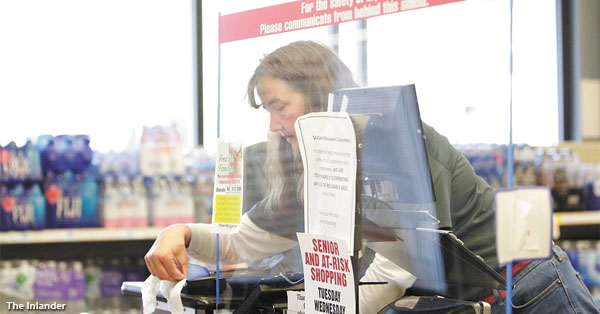NEWS ROUNDUP
Alcoa to close Intalco Works ● Death at Tyson ● 28-day shifts
Thursday, April 23, 2020
LOCAL
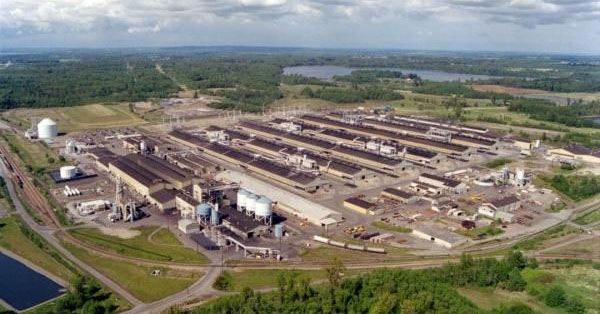
► From the Bellingham Herald — Alcoa to close Intalco Works smelter near Ferndale, lays off around 700 employees — Alcoa Corporation announced that it will close its Intalco Works smelter near Ferndale amid declining market conditions, laying off around 700 employees. The curtailment is expected to be complete by the end of July 2020. Intalco will be working with its employees, the International Association of Machinists and Aerospace Workers Union, and other stakeholders to minimize the impact of the curtailment.
► From the Bellingham Herald — Alcoa Intalco Works’ timeline of 54 years in Whatcom County — Potlines have been closed and workers laid off in the past, only to reopen years later.
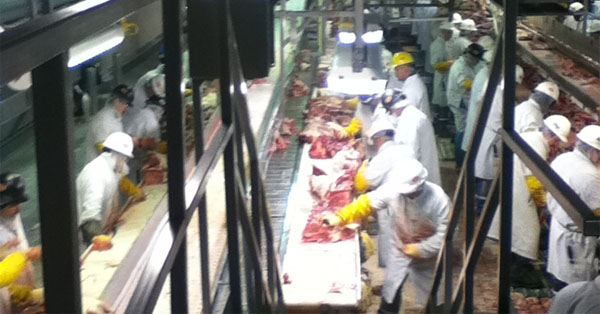
A photo taken several years ago from inside the Tyson meat plant in Wallula.
► From the Tri-City Herald — Tyson beef plant worker in Tri-Cities dies of coronavirus — The number of COVID-19 cases linked to the beef slaughter and packing plant at Wallula in Walla Walla County was 101 as of Wednesday, according to local health districts. The Walla Walla County Department of Community Health said on Tuesday that it was requiring Tyson Foods to allow it to test each of the approximately 1,400 workers at the plant for COVID-19 within the next week. But some are calling for the plant to close until the outbreak is contained. More than 4,000 people have signed a petition at change.org calling for the plant to close for 14 days to protect workers.
TODAY at The Stand — The Union Difference: A tale of two plants — Teamsters at the Lamb Weston potato plant in Pasco have workplace safety and respect on the job. Nonunion workers at the Tyson beef plant down the road have Washington’s biggest COVID-19 hotspot. And they’re still open for business.
EDITOR’S NOTE — Facing mounting political and public pressure, Tyson Foods closed two pork plants in Iowa and Indiana yesterday as the virus ripped through those plants and their local communities. But not here in Washington.
 ► From the Tri-City Herald — Dying alone from coronavirus: A Tri-Cities family’s final goodbye — Lupe Olivera, who did the physically demanding work of a butcher at the Tyson Fresh Meats beef packaging plant, developed symptoms in late March but with few testing supplies for COVID-19 available in the Tri-Cities, he was not tested for the virus. So he was sent home with antibiotics. After his condition worsened, doctors agreed to test him and it came back positive around April 1… His wife, who later would also test positive for COVID-19, drove him to Kadlec Regional Medical Center in Richland, where she was told to stay in the car as healthcare workers took him inside. It was the last time she would see him face to face.
► From the Tri-City Herald — Dying alone from coronavirus: A Tri-Cities family’s final goodbye — Lupe Olivera, who did the physically demanding work of a butcher at the Tyson Fresh Meats beef packaging plant, developed symptoms in late March but with few testing supplies for COVID-19 available in the Tri-Cities, he was not tested for the virus. So he was sent home with antibiotics. After his condition worsened, doctors agreed to test him and it came back positive around April 1… His wife, who later would also test positive for COVID-19, drove him to Kadlec Regional Medical Center in Richland, where she was told to stay in the car as healthcare workers took him inside. It was the last time she would see him face to face.
► From the Yakima H-R — Yakima County has highest rate of COVID-19 cases in the state, double the state rate — Yakima County has the highest rate of COVID-19 infections in the state by a significant amount, and is double the state average, according to state Department of Health data.
► From the Wenatchee World — Confined housing and lack of info: Farmworkers brace for COVID-19 — In the midst of the COVID-19 crisis some of the most essential workers are those in the orchards, fields and packing houses providing the public with food. Legal and Hispanic advocacy organizations are arguing that these workers are at a higher risk of infection from COVID-19 and need better protections. Columbia Legal Services sued earlier this month asking the state to take emergency action to protect agriculture workers.
► From the Wenatchee World — Expanded testing planned after ‘remarkable’ rate of cases in agriculture housing — Over the weekend, all 71 residents of an agricultural housing facility near East Wenatchee were tested. Half of the results came back positive. All were previously asymptomatic. The results are already changing how the Chelan-Douglas Health District is approaching testing of people in communal living sites, including agricultural housing and homeless shelters.
► MUST-READ from The Inlander — Unions promise to protect workers, and the coronavirus is demanding they prove it — Right now, the American workforce is fighting for its survival on two fronts, battling a rampaging virus and a collapsing economy. For some workers, their jobs are in danger. For other workers, their lives are… Unions throughout the region say they’ve rushed into the fray on behalf of their workers, hammering out new worker-safety agreements with employers, pushing for temporary pay increases, and — in some cases — protecting the free speech rights of their members to speak out against the unsafe practices of their employers. Yet, at the same time, the crisis has given anti-union groups the chance to call for unions to be defunded… “It keeps (the Freedom Foundation) afloat in right-wing circles and makes their funders think they’re doing work,” says Peter Starzynski of the pro-union Northwest Accountability Project. “They’re exploiting the pandemic to further a political mission that is dictated by out-of-state billionaires. It’s shameful.”
► From the Spokesman-Review — Spokane Public Schools board expected to declare financial emergency, cut costs — Senior staff and board members agreed, the only option is to declare a financial emergency that could include reduction in current services and personnel. No action was taken Wednesday night, but a formal declaration is expected at next week’s regular board meeting.
► From the Seattle Times — School nurses are joining ranks in testing clinics, health departments to boost coronavirus efforts — With school buildings closed through the summer, school nurses are busy tracing contacts. Staffing COVID-19 call centers. Giving medical advice to people with coronavirus-like symptoms. Some are taking the temperatures of children at day care centers, and essential school staff who make and distribute bagged lunches.
► From KIRO 7 — King County Metro creates bus passenger limits
BOEING
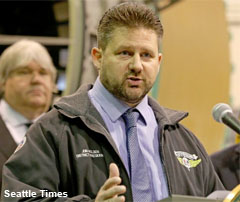 ► From the Seattle Times — Boeing workers’ return after coronavirus closure is a test case for industrial recovery — Boeing management instructed about 27,000 factory employees to return to work this week. Yet with the coronavirus still threatening lives nationwide, the first to return came back with varying levels of unease. “Our members have some tough decisions to make personally on whether they can remain in the workplace or not,” said Jon Holden, President of the International Association of Machinists (IAM) District 751. Holden said each employee must choose for themselves how to weigh the risk in light of their family’s health concerns and their economic situation. He said all his members should know that if they cannot be in the workplace due to their health circumstances, they can stay out. And that if they do go to work and find that safety measures aren’t being followed, they can invoke an “imminent danger” clause in their contract and demand that work in their area stop until the safety issue is dealt with.
► From the Seattle Times — Boeing workers’ return after coronavirus closure is a test case for industrial recovery — Boeing management instructed about 27,000 factory employees to return to work this week. Yet with the coronavirus still threatening lives nationwide, the first to return came back with varying levels of unease. “Our members have some tough decisions to make personally on whether they can remain in the workplace or not,” said Jon Holden, President of the International Association of Machinists (IAM) District 751. Holden said each employee must choose for themselves how to weigh the risk in light of their family’s health concerns and their economic situation. He said all his members should know that if they cannot be in the workplace due to their health circumstances, they can stay out. And that if they do go to work and find that safety measures aren’t being followed, they can invoke an “imminent danger” clause in their contract and demand that work in their area stop until the safety issue is dealt with.
► From the (Everett) Herald — Air Force: Boeing can fix flawed $44 billion KC-46 tanker — The Air Force’s top military officer says he’s convinced that Boeing finally has a solid plan to fix the flawed refueling system that has bedeviled its $44 billion aerial refueling tanker program. It had been discovered that shadows or the glare of the sun sometimes can hamper the 3D cameras’ view.
THIS WASHINGTON
► From the Seattle Times — Washington sees nearly 90,000 new jobless claims as coronavirus crisis continues — Washington state received nearly 90,000 initial claims for unemployment insurance last week, a significant decline from the prior week–but state officials have warned that the worst is not over.
► From the Spokesman-Review — State ramps up contact tracing forces in preparation for reopening — There are 700 people who are trained to do contact investigations, health officials said Wednesday, and by the second week of May, they will have 1,500. The state is enlisting members of the National Guard as well as volunteers to help.
► From the Olympian — Coronavirus has hit Washington’s transportation budget hard. Now state is asking for help — Washington’s transportation programs are facing losses of up to $100 million a month, a 38% shortfall that the state’s transportation secretary warns will affect construction and maintenance of highways, rail, traffic control and other projects.
 ► From the Seattle Times — Republican leaders begin to push back on Inslee’s ‘stay home’ order, seek easing of some restrictions — House Minority Leader J.T. Wilcox (R-Yelm), who’s been supportive of Inslee throughout the crisis, announced his frustration and said he would begin objecting, in some instances, to Inslee’s executive orders. Meantime, the GOP-backed sheriff of Snohomish County announced he would not enforce Inslee’s stay-home directive. A Republican candidate for governor sued Inslee in federal court, arguing the order violates First Amendment guarantees of religious freedom, assembly and free speech.
► From the Seattle Times — Republican leaders begin to push back on Inslee’s ‘stay home’ order, seek easing of some restrictions — House Minority Leader J.T. Wilcox (R-Yelm), who’s been supportive of Inslee throughout the crisis, announced his frustration and said he would begin objecting, in some instances, to Inslee’s executive orders. Meantime, the GOP-backed sheriff of Snohomish County announced he would not enforce Inslee’s stay-home directive. A Republican candidate for governor sued Inslee in federal court, arguing the order violates First Amendment guarantees of religious freedom, assembly and free speech.
The Stand (April 22) — Inslee issues recovery plan to gradually, safely return to work
► From the Washington Post — States rushing to reopen are likely making a deadly error, coronavirus models and experts warn — By the end of the week, residents in Georgia will be able to get their hair permed and nails done. By Monday, they will be cleared for action flicks at the cineplex and burgers at their favorite greasy spoon. And it will almost certainly lead to more novel coronavirus infections and deaths. As several states — including South Carolina, Tennessee and Florida — rush to reopen businesses, the sudden relaxation of restrictions will supply new targets for the coronavirus that has kept the United States largely closed down, according to experts, math models and the basic rules that govern infectious diseases.
THAT WASHINGTON
► From Fox Business — OSHA is ‘AWOL’ on setting coronavirus standards to protect workers: AFL-CIO president — The Occupational Safety and Health Administration is “AWOL” on setting new standards for the post-coronavirus workplace, AFL-CIO President Richard Trumka said on Wednesday. Trumka wants the U.S. to adopt an emergency temporary contagious disease standard so “every employer will know what’s out there what they have to do and every worker will know what they’re entitled to,” he said.
► From HuffPost — Dr. Anthony Fauci: ‘We will have coronavirus in the fall’ — “I plead with the American public,” Fauci said as he urged people to keep abiding by social distancing measures and asked lawmakers to heed expert advice.
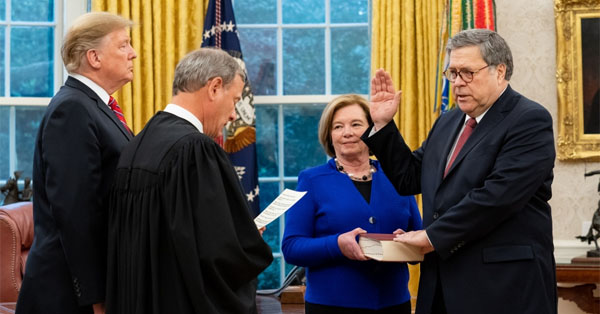
Attorney General William Barr solemnly swears as Trump looks on.
► From Politico — Union: DOJ deportation appeals workers fear overcrowding — AFGE, the union for lawyers and support staff who handle Justice Department immigration appeals, says their office’s working conditions put workers’ lives in danger. And employees in the DOJ office handling those immigration appeals said many suspect it’s because the department prioritizes high deportation numbers over worker safety. “I feel like half the time, I’m working on Trump’s reelection,” said an employee in the office who spoke anonymously because of concerns about retaliation. “This is just a piece for him to tout when reelection time comes up about how much he’s getting done.”
► From the Washington Post — Trump signs order pausing immigration for 60 days, with exceptions — The order, which takes effect Thursday, will not apply to immigrants who already are living and working in the United States and are seeking to become legal permanent residents. Medical professionals, farmworkers and others who enter on temporary “nonimmigrant” visas are unaffected, and the suspension also exempts the spouses and underage children of U.S. citizens, among other carve-outs.
► From ABC News — House lawmakers scramble back to D.C. to vote on $484 billion relief bill — It will provide $310 billion for the small business loan program, $60 billion for the Small Business Administration disaster relief fund, $75 billion for hospitals, and $25 billion for testing (but nothing for struggling states).
► In the NY Times — McConnell says states should consider bankruptcy, rebuffing calls for aid — The remarks drew a caustic reaction from Gov. Andrew M. Cuomo of New York, who called the bankruptcy suggestion “one of the saddest, really dumb comments of all time.”
► From The Hill — GOP sounds alarm bell over coronavirus-fueled debt
 EDITOR’S NOTE — Here’s what those same people looked like a couple years ago when they passed a $1.5 trillion tax cut for corporations and the wealthy that ballooned the U.S. budget deficit by more than 50 percent and had no significant impact on business spending (creating jobs)…
EDITOR’S NOTE — Here’s what those same people looked like a couple years ago when they passed a $1.5 trillion tax cut for corporations and the wealthy that ballooned the U.S. budget deficit by more than 50 percent and had no significant impact on business spending (creating jobs)…
NATIONAL
► From the Guardian — Trader Joe’s and other U.S. firms suppress unionization efforts during pandemic — Companies, including grocery chains Trader Joe’s and Whole Foods, airport concession operators, local authorities and even a furniture company owned by the billionaire Warren Buffett have moved to control efforts to unionize as workers become increasingly concerned about workplace safety during the emergency.
TODAY at The Stand — The Union Difference: A tale of two plants — Teamsters at the Lamb Weston potato plant in Pasco have workplace safety and respect on the job. Nonunion workers at the Tyson beef plant down the road have Washington’s biggest COVID-19 hotspot. And they’re still open for business.
EDITOR’S NOTE — Tired of working in unsafe conditions? Get more information about how you can join together with co-workers and negotiate a safer workplace and a fair return for your hard work. Or go ahead and contact a union organizer today!
► From The Onion — Report: Amazon using heat-sensing alien hunters to track workers attempting to unionize — At press time, the effort was suspended after several heat-sensing alien hunters collapsed in an Amazon warehouse from exhaustion.
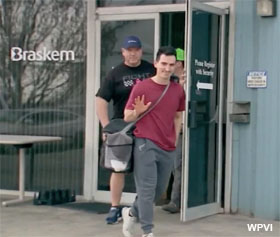 ► From the Washington Post — They lived in a factory for 28 days to make millions of pounds of raw PPE materials to help fight coronavirus — At his factory just off the Delaware River, in the far southeastern corner of Pennsylvania, Joe Boyce clocked in on March 23 for the longest shift of his life. In his office, an air mattress replaced his desk chair. He brought a toothbrush and shaving kit, moving into the Braskem petrochemical plant in Marcus Hook, Pa., as if it were a makeshift college dormitory. The casual office kitchen became a mess hall for him and his 42 coworkers-turned-roommates. The factory’s emergency operations center became their new lounge room. For 28 days, they did not leave — sleeping and working all in one place. In what they called a “live-in” at the factory, the undertaking was just one example of the endless ways that Americans in every industry have uniquely contributed to fighting coronavirus. The 43 men went home Sunday after each working 12-hour shifts all day and night for a month straight, producing tens of millions of pounds of the raw materials that will end up in face masks and surgical gowns worn on the front lines of the pandemic.
► From the Washington Post — They lived in a factory for 28 days to make millions of pounds of raw PPE materials to help fight coronavirus — At his factory just off the Delaware River, in the far southeastern corner of Pennsylvania, Joe Boyce clocked in on March 23 for the longest shift of his life. In his office, an air mattress replaced his desk chair. He brought a toothbrush and shaving kit, moving into the Braskem petrochemical plant in Marcus Hook, Pa., as if it were a makeshift college dormitory. The casual office kitchen became a mess hall for him and his 42 coworkers-turned-roommates. The factory’s emergency operations center became their new lounge room. For 28 days, they did not leave — sleeping and working all in one place. In what they called a “live-in” at the factory, the undertaking was just one example of the endless ways that Americans in every industry have uniquely contributed to fighting coronavirus. The 43 men went home Sunday after each working 12-hour shifts all day and night for a month straight, producing tens of millions of pounds of the raw materials that will end up in face masks and surgical gowns worn on the front lines of the pandemic.
► From Politico — Wisconsin officials: 7 virus cases may be related to in-person voting
The Stand posts links to Washington state and national news of interest every weekday morning by 10 a.m.

